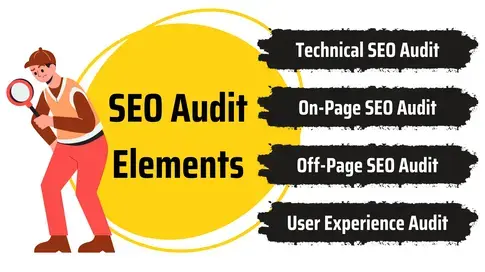The World Wide Web has around 1.5 billion websites.
Among the crowd, what makes yours stand out?
No matter how good the design looks and how quality of the content is, they aren’t enough. Sometimes, you need deeper assessment to improve visibility.
That’s why some professional audit tools and services exist. They let you analyze your website, highlight the underlying issues, and suggest improvements.
This helps to increase–
Search engine ranking
Traffic
Conversion
Improve ranking by getting the most Professional SEO audit services!
Website Analysis Through Professional SEO Audits: Why Does It Matter?
A comprehensive site examination from an SEO’s point of view.
“Website Analysis Through Professional SEO Audits” means thoroughly assessing a website’s SEO factors that affect rankings.
The components include:
| Site speed | Content quality |
| Mobile usability | Keyword use and Meta |
| Indexing | Internal linking |
| Crawlability | Easy navigation |
| Secure connection | Accessibility |
A professional SEO audit uses a tool to dig deeper than just surface-level stats. It checks various components and provides actionable insights.
The goal is to–
Identify areas for improvement on your site elements. It can be- structure, content, technical aspects, and backlink profile.
Increase organic search ranking and visibility on search engine results pages (SERPs).
Benefits
Identifies technical issues
Optimizes SEO strategy
Stays competitive
Adapt to algorithm changes
Enhances user experience
How Helpful Is Website Analysis?
It’s because you need to stand out from the 1.5 billion websites that exist on the World Wide Web.

Improve Rankings and Visibility
The tool solves issues like broken links, slow pages, or outdated content. It ensures your website meets the criteria for top rankings.
This eventually helps boost your site’s rankings and visibility on search engines.
Higher SERP rankings mean:
Increased traffic
More brand awareness
Potential conversions
Enhance User Experience
Want to offer a seamless experience for the visitors?
SEO audits deliver just that. They identify technical errors like slow loading times and difficult navigation. You also get fixable suggestions.
Solving these issues leaves your website well-functioning. This works to enhance visitor engagement and reduce bounce rates.
Result: Happy and content audience.
Competitive Benchmarking
Stand out among the rival crowds.
Such an SEO audit tool gives you insights into your website and allows you to compare it with the competitors.
This helps you identify the strengths they have and get a competitive advantage.
You can also strategize your next steps and outshine your rivals.
4 Key Components of an SEO Audit

Technical SEO Audit
It focuses on the backend aspects of your website. Key areas include-
Site Speed
Ensure your page loads within 3 seconds with tools to improve ranking.
Avoid slow-loading designs. Keep it simple and user-friendly.
Mobile Usability
Around 96% of users access the internet through mobile, Statista says. Google prioritizes mobile-friendly sites while ranking websites.
Indexing
Search engines need to crawl your website.
For this, check the site's indexing status on Google Search Console.
Ensure your pages are visible to search engines. This allows SERPs to find and rank your page.
On-Page SEO Audit
It highlights the content and elements within your website.
Content Quality
The content has to be original, intriguing, informative, valuable, and relevant to your audience.
Avoid duplicate, AI-generated, and thin con
Metadata
Titles, descriptions, and headers should include keywords. Optimize them with the tools.
That way, your site can get better SEO and more visitors.
Keyword Optimization
Use the right and winning keywords.
Don’t overstuff them. Infuse them naturally into the content.
Off-Page SEO Audit
It examines factors outside your website that influence SEO.
Backlinks
Quality backlinks enhance your site’s authority
Evaluate the quality and quantity of the links. Make sure you get links from reputable sites.
Domain Authority
It measures your website’s credibility and transparency.
Use tools like Moz. Assess your domain authority score. Work on building high-authority links to improve the site.
User Experience Audit
It’s about Google User Experience that helps keep your visitors on the site longer.
Navigation
Ensure the site is easy to browse.
Focus on-
- A clear site structure
- Intuitive navigation menus
- Relevant internal linking
- Descriptive URLs
- A search bar
- Mobile Optimization
Accessibility
Your website should be usable for everyone.
Provide descriptive alt text for images. Use sufficient color contrast. Enable keyboard navigation. Use clear and simple language. Design accessible forms.
Design
A visually appealing design creates a positive impression.
Make sure the UI is easy even if there’s any intricate design. It should feel smooth– be it scrolling or page loading.
Consider interesting color contrast design with big, readable fonts. Make sure the elements are placed properly. Avoid making it messy.
Step-by-Step Guide to Performing an SEO Website Audit
#Step 1 - Start with the site crawl
Use tools like Screaming Frog. Get a comprehensive overview of the website. Such a tool crawls your site and points out problems like broken links and duplicate content.
#Step 2 - Evaluate site speed and performance
Run speed test with GTmetrics. Analyze your site loading speed. Pinpoint areas that are slowing down the site.
Make sure your page loads between 0 and 2 seconds. Fast-loading sites can easily provide a better user experience and rank higher on SERPs.
#Step 3 - Analyze on-page elements
Look at on-page elements. These include titles, descriptions, and headings.
Ensure they are optimized for the target keywords and are intriguing for users.
#Step 4 - Check for broken links and redirects
Broken links can repel your target group. This can affect SEO ranking.
Find the issues with Ahrefs or Semrush tools and fix them.
#Step 5 - Conduct a backlink analysis
Use SEO tools like Ahrefs to troubleshoot Off-page issues.
Examine the quality of the website linking to yours. Remove harmful links that can affect you and your site’s reputation.
See where your backlinks are coming from. It helps evaluate your website’s authority.
Make sure they come from reputable sites.
#Step 6 - Generate an audit report
Compile your findings into a report.
Provide actionable insights or use tools to find one. This will serve as a roadmap for vital changes.
You can also consider hiring Professional SEO audit services to do everything for you. This includes finding issues and coming up with solutions.
Best Tools for Professional SEO Audits
- SEMrush SEO Analyzer
- Ahrefs Website Audit Tool
- Google Search Console
- Screaming Frog
- Ubersuggest
Here are a Few Templates and Examples for Website Analysis
SEO Audit Checklist: Don’t Miss The Necessaries
Technical Checks
Ensure your website uses a Mobile-friendly design. Check for SSL certificates to increase security.
Content Review
Analyze keyword density and plagiarism. Both increase the content quality.
Performance Metrics
Test site speed and core web vitals.
Backlink Assessment
Monitor the quantity, quality, and toxicity of backlinks.
A Few Common Mistakes in Website Analysis
- Ignoring mobile-first indexing
- Overlooking outdated content
- Relying solely on free tools
FAQ: Website Analysis Through Professional SEO Audits
What is an SEO audit used to analyze websites?
An SEO audit assesses different elements related to your website. It identifies what’s working and what needs improvement. The main goal is to improve visibility and ranking on search engines.
What is website analysis in SEO?
It’s a simple assessment of the SEO factors of the website.
Website analysis involves assessing different aspects of a site to enhance overall performance. This includes- technical SEO and content quality.
What tool can help you conduct an SEO audit of a website?
Use these 3 tools. They can help you conduct an SEO audit of a website:
- Semrush
- Ahrefs
- Google Search Console
How to do an SEO website audit step by step?








